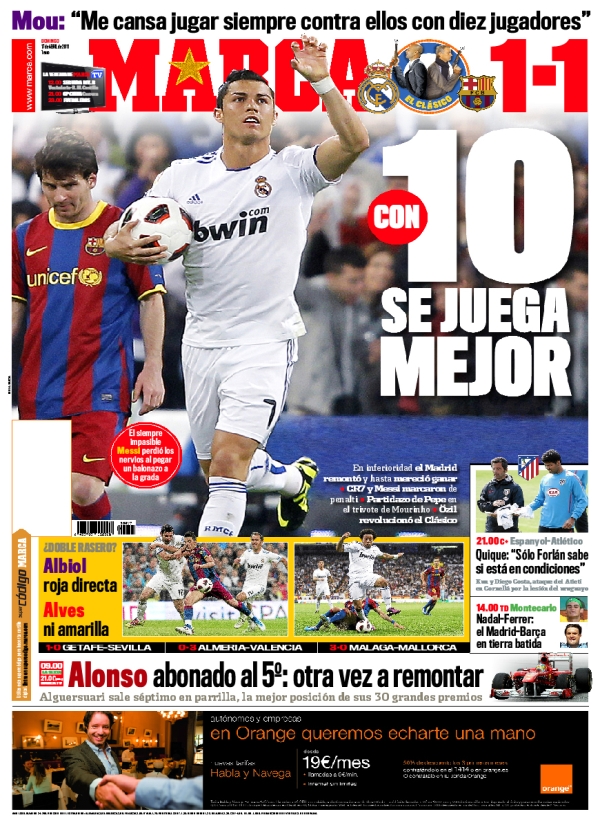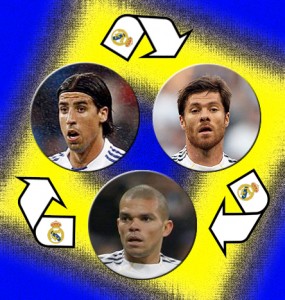As we draw towards the close of another Premiership season, I wanted to offer a few random thoughts about how things have played out and, of course, a view on Tottenham Hotspur’s year.
Tottenham’s year
One of the things that has been creeping into conversations I have had recently with fellow Spurs fans, is the desire to avoid being in the Europa League next season, preferring to miss out on Europe all together. The idea is, without the distraction and tiredness that extra games in the Thursday Night Cup would bring, Tottenham would be more likely to challenge for a Champions League place next season. First time I heard this, I did not think it was an unreasonable position to take. However, a couple of issues have made me change my mind – mainly, the idea that qualifying for the
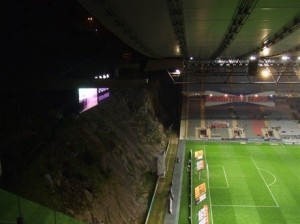
Champions League is in itself more preferable to being in a competition we could potentially win. Braga and Porto (Europa League finalists this season) are good teams but nothing for Spurs to fear given their wins this season over Milan and Inter. Merely being in the Champions League without a realistic shot at winning the trophy, is not better than triumphing in the Europa League. While you can attract better quality players once in the Champions League, a complete lack of European football next season, combined with highly lucrative contract offers being available at other clubs who have qualified like Manchester City and Chelsea, would result in Tottenham struggling to improve their squad enough to be in contention for a top four place next year anyway. Harry Redknapp has already stated that it will be very difficult for us to overtake Manchester United, Chelsea, Arsenal and Manchester City, and will be up against Liverpool who are attempting to do the same, so why is it assumed that less games will be the key. Admittedly, last season a lack of European football meant that Spurs were able to focus on the League and gain fourth place, but they benefitted mostly from the decline in form of Liverpool that year. The biggest step forward Tottenham have made in the last 10 years was in 2005/2006 when they qualified for the UEFA Cup through the League, the first time that had been achieved by Spurs in over 20 years. And that’s the other thing, I really enjoyed that campaign in the 2006/2007 season, everything about it: getting to sing “We’re all going on a European Tour”, the away trips to Prague, Germany and, best of all, Braga (photo above was our seats, adjacent to the mountainface), the home games and the atmosphere at the start of the second half against Sevilla when the fans willed the team back into the tie (unsuccessfully in the end, but it was still a great moment). I have the scarves, the photos and the memories from those trips I made with my sister (and 4,000 other Spurs fans) and it’s given me a real affinity for the competition. While this year might have been a letdown in the end for Tottenham, with too many draws and bad results against lower placed teams (2 points out of 12 from games against Blackpool and West Ham) costing us a place in next season’s Champions League, qualifying for the Europa League would be a satisfactory ending.
Manchester United won their record 19th League title this weekend, the same day as their cross-city rivals won their first trophy in 35 years as City took the FA Cup. For the blue half of Manchester, it was a just reward for their fans who stuck with them even when they dropped to the third tier of English Football and still turned out in their numbers every week to support their team. Overall though, City are a boring side to watch and I am not going to be making any efforts to catch their Champions League games next year. There was a nice reminder of City’s recent struggles on Saturday, as they were facing Stoke City, managed by Tony Pulis who was the boss at Gillinhgam in 1999 when they played Man City in the League One (old Division Three) playoff final. In that game, City were 2-0 up with virtually no time left to go, only for Gillingham to somehow come back and score twice, going on to win on penalties. When the two sides met again in a later season, the Gillingham fans taunted their opposite number with “Two Nil, and you $%*#ed it up”, but the City fans reminded those who had given up and missed the ending with a retort of “Two Nil, and you all went home”. Congratulations Manchester City fans, Mancini and Mansour, not so excited for you.
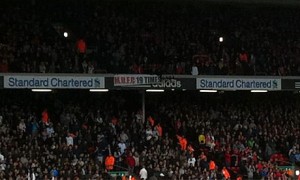
Sir Alex Ferguson and United also finally reached a peak they had been desperate to reach on Saturday, when they overtook Liverpool for most amount of English League titles. Their dominance since 1993 has been incredible and they won the league this year thanks to incredible home form and by outlasting the other contenders at the end. But the biggest thing for me about this win, was it provided another example of fans carrying out practical jokes at the expense of their rivals. At the beginning of Sunday’s game between Liverpool and Spurs, some United fans went into the ground and unfurled a banner reading “M.U.F.C 19 Times” during the chorus of “You’ll never walk alone” at Anfield (plus some extra spies in their to get the photographic proof of it). This has come hot on the heels of Blackpool taunting Preston North End as the latter fell out of the Championship and into the third tier of the English Leagues. During their final home game, Preston fans were subjected to a plane flying over with a message saying “Poor Little Preston Enjoy League One” and then again “We are Superior Love Blackpool FC”. Fans looking to get away from it all by watching a game-show got another reminder, when a Blackpool supporting producer of the British show “Countdown” slipped this anagram into the final conundrum round – PNECRISIS (PNE = Preston North End, the answer is the end of this column!) I feel like I’m making this up…but then again on Sunday, within minutes of Wigan scoring an equaliser which meant West Ham would be relegated, a plane carrying a message of “Avram Grant – Millwall Legend” flew over the DW Stadium – the Hammers manager clearly only welcome in that part of London now, given that he was sacked moments after relegation was confirmed with the final whistle in that game. So long as it stays harmless fun-poking, I am all for this banter between fans of rival clubs.
The Relegation Battle
Although West Ham fans really dislike Tottenham, I have to admit I am sad to see them relegated again from the Premiership. They are a club with a lot of history and they really should be a top flight team, but once more they are going down with a squad with a vast amount of talent. I do not have any sympathy for the owners, Gold and Sullivan are certainly not a likeable pair, but the fans deserve better. When the fixture list comes out each year, Tottenham’s games against West Ham are definitely among those that I look for, and definitely are of more interest than games against Birmingham, Wolves or Wigan (unless we beat the latter 9-1 again). With an Olympic Stadium to fill in the near future, it is imperative for the club that this demotion is not a length one. While many Spurs fans will celebrate the Claret and Blue being knocked out of the Premiership, I have sympathy for the Hammers and their supporters and hope they make a speedy return, not least becase I want us to actually beat them next time.
The remaining two sides to go down will be from Wigan, Blackburn, Birmingham, Wolves and Blackpool. Since we are playing them and they are one of the most boring sides to watch, I will be happy to see Birmingham go down. There could be controversy at Old Trafford as already Champions United will rest players ahead of the Champions League final meaning Blackpool could have a good chance of staying up, Wigan will stay up if they can win at Stoke and that would leave it as a shootout between Wolves and Blackburn in the game at Molineux. My prediction, Blackpool lose to the kids of United and Birmingham go with them.
Arsenal & Chelsea
All season long, there was a debate about who would end up in fourth place, would it be the billionaires of Manchester City or would Tottenham repeat their feat from last season. In the end, the team who’s likely to finish in 4th looks like it could well be…Arsenal. Another under-achieving season for a Arsene Wenger’s team, who three months ago were looking to win four trophies, but ended up with 0. But, while the Emirates Trophy Cabinet can still be returned unused to the high-end furniture store in Islington it was procured from all those years ago, St. Totteringham’s day was on the 7th May this year, the day that Spurs can no longer finish above Arsenal in the league. This day has been celebrated at some point in every single season since 1994/95 when Tottenham last finished above their north-London rivals. So while I’m happy that they did not win anything, a trophyless season for Arsenal is not something I will be crowing about. Chelsea, deceptively brilliant at the start of the year due to an easy run of fixtures, ended up not quite knowing what kind of team they were and looked great at times, and played Torres at others. Another failure in the Champions League means that Ancelotti’s time is probably up there, but the constant turnover of managers and players means they will struggle to find the repeat success that Manchester United have enjoyed.
So football is nearly over for the summer (except of course, for the Copa America and MLS…okay well the Copa America) – not the best season for Spurs, not the worst one either though. Next season, it will probably more of the same – frustrating defeats and draws to teams at the foot of the table, a good European run (albeit in the lesser competition), but please, next year, how about a trophy. The FA Cup would be nice, we last won that in 1991. I remember it, but the older I get the fainter the memory…
But before I forget – the anagram – PNECRISIS = Priciness

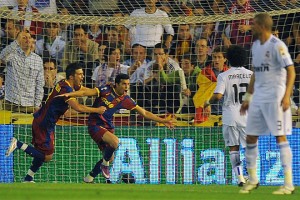
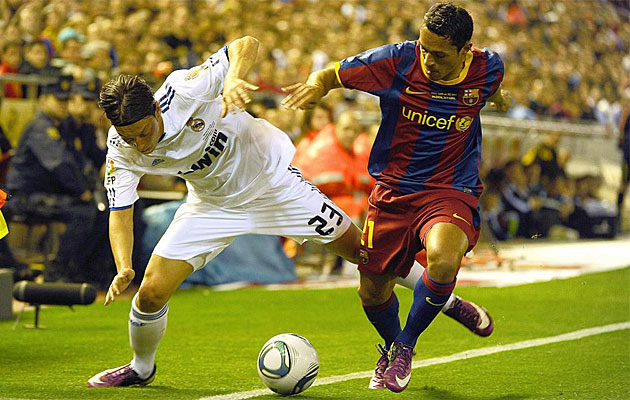
 Less than a week after their hard fought tie in league play, Madrid and Barça met in the final of the King’s Cup. Mourinho sent his defensive set into the midfield again, then put in Özil from the start for an added touch of creativity in attack, and sprinkled the whole side with an extra dose of aggression dust.
Less than a week after their hard fought tie in league play, Madrid and Barça met in the final of the King’s Cup. Mourinho sent his defensive set into the midfield again, then put in Özil from the start for an added touch of creativity in attack, and sprinkled the whole side with an extra dose of aggression dust.
